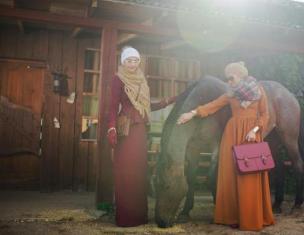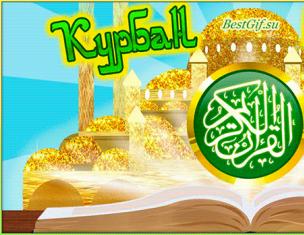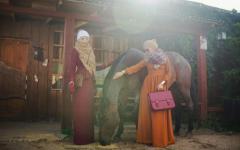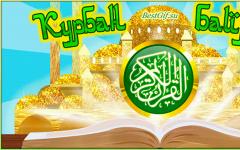Elena Agrankova
Target: Introduce children to national culture and traditions. To form a festive culture, to give knowledge about the life of the Crimean Tatar people. To acquaint with the Crimean Tatar folk games, songs, dances. To develop in children the desire to actively participate in the holidays.
Attributes: national costumes, a basket with vegetables, fruits, a lamb toy, plates with national ornaments, puzzle plates, a dance handkerchief, a box, a rope, a tambourine.
Entrance to the song "Men Severin".
Vedas. one. Selam alaikum urmetli ve saigyly musafirler, anna babalar! Bizim tetbirimizge hosh keldiniz!
Vedas. 2. Hello children, hello dear guests! We are glad to welcome you to our kindergarten. It was not in vain that we started the meeting with a song, because, you see, what a holiday without music - dancing, fun, games.
Vedas. one. Er bir bayram balalar ichun kuvanchtyr! Bayramlaryngy balalar sabyrsyzlyknen bekleiler! (Each holiday is a joy in the eyes of children. Our children believe that only joyful, exciting events await them. And one of them is our meeting today).
Vedas. 2. We have celebrated national holidays more than once. Let's take a look at their features. You will pass the tambourine to the music. When the music ceases to sound, the one who has the tambourine in his hands will have to name the holiday about which I will speak.
Questions:
1. On this holiday, a kalakai is rolled down a hill to find out if the year will be fruitful. (Khidyrlez)
2. Nasyl bayramdan evel oraza tutalar? (Before what holiday do they fast? (Oraza Bairam)
3. What holiday symbolizes the beginning of a new year? (Navrez)
4. Oraza bayramyndan dream sent bayram kele? (After Oraza Bayram, what holiday comes? - Eid al-Adha)
Tambourine game.
Vedas. one. Khalkymyznyn keledzhegi parlak olsun! Anna-vatanymyzda kechirilgen er kunge shukur etemiz.
The more we value the past
And in the old we find beauty,
At least we belong to a new one.
Vedas. one. Adet uzre evge kelgen adamga yani musafirge kokuly kave tea berille, sofra bashynda merakly sogbetler keche. (The phrase "Crimean Tatar hospitality" has become almost a catch phrase, a symbol that the guest will have a great time and go home happy and satisfied.)
Vedas. 2. Hosts invite guests to a place of honor in the house (tor). First of all, they are necessarily treated to coffee with sweets. So our guys want to adequately meet their guests. /serve coffee, sweets/
1 child Khosh keldin, Kurban Bayram,
Mubarek Eid al-Adha.
Kuvanamyz biz san'a
Muslims inshallah!
2 children Kurban koylar chalynsyn,
Bol sofralar kurylsyn,
Eyilik niet etip
Dua san'a okulsyn!
3 reb. K'ol koterip yalvaram
Yardym at bizge, Allah,
Jurekler biraz osin
Gham-kasevet exilsin.
4 children Bir bin adly bir Allah,
Bin bir belyadan sakla,
Bakht-seadet kysmet et,
Kun korsin bizim millet.
The song "Eid al-Adha"
Vedas. one. Kurban bayram mukkades bayramlaryndan birisidir. Kurban bayram merametlik, biri birine gonuldeshik, urmet bayramydyr.
Vedas. 2. On this holiday, it is necessary not only to feed the whole family, but also to distribute part of the food to poor hungry people.
Vedas. one. Bayramda fukarelerge, oksyuz balalarga, kartlargya yardym etile (This ritual treat is called “saadaka”, and it is necessary in order to avoid illness and misfortune in the future.)
Vedas. 2. In honor of the holiday, it is customary to visit each other and give gifts.
Vedas. one. Kelinyz biz musafirlikke baraiyk! (Let's go visit someone and see how people prepare for this day.)
Vedas. 2. According to tradition, among the Crimean Tatars, the younger ones go with congratulations to the elders. How this happens, now our children will show you.
Vedas. one Torunlar kartana kartbabany khayrlamagya keldiler. (So, the grandchildren came to their grandparents to congratulate on Eid al-Adha)
The children come to the “house”, at this time the grandmother comes out with a basket of vegetables and fruits and the grandfather with a lamb on his shoulder.

Grandchildren:- Salam alaikum, kartbaba ve kartana!
Old men:- Aleikum salam, hosh sefa keldiniz!
Grandchildren:- Kartbaba, kartana, life buyuk bayramnen Kurban- Bayramnen khairlaimyz! (kiss the hands of the old people)

Vedas. 2.- Grandmother, grandfather, where were you?
Vedas. one.- We, beloved children, went to the market.
Vedas. 2.- Grandma, grandpa, what did you buy there?
Vedas. one.- We were offered vegetables, fruits, lamb.
Vedas. 2.- The lamb will give us wool -
Vedas. one. I will knit your socks for the winter.
Children.- Kartbaba, kartana, siz qaida bardynyz?
Grandfather, Bab.- Bazarga
Children.- Kartbaba, kartbaba, bazardan is not aldynyz?
Grandfather, Bab.- Bir koi
Children.- Kartbaba, kartbaba, who am I not a kerek?
Grandfather, Bab.- Koi bize yun berejek.
Children.- Kartbaba, kartbaba, yun bizge not kerek?
Grandfather, Bab.- Yunden yip ischlermiz.
Children.- Kartbaba, kartbaba, yip bizge not kerek?
Grandfather, Bab.- Yunden san'a chorap orermiz.
Granddad. Buyurunyz, balalar. Oturunyz! (Sit down, children. We are so glad to see you)
Grandmother. Kana, balalar, aitynyz ischleriniz sent, bala bagchada not orendynyz? (Tell me how you are doing, what do you do in kindergarten)
Granddad. And I really want to know what you learned in kindergarten!
grandchildren. Peck guzel, kartana, biz oynyaymyz, yirlaimyz, yazamyz, cartoonler bakamyz. (we play, dance, write, watch cartoons).
Grandmother. Kana, balalar, bizge de shiir aytynyz, biz de kuvanayyk! (Tell us, children, poems for us.)
Kuneshchik (Sun)
1. Kuneshchik kuneshchik
Sary bashly ateshchik
Kel, Beraber oynayk,
Kelchi turkyu yyrlayik
2 Kelchi dzhanym kuneshchik
Sarah bashly kuneshchik
Kumdan evchik kuraiyk
Ve ony kyzdyrayyk
Alma (Apple)
3. Alma Ashai Aliye,
Armut Ashai Alime,
Ayshechik de ashaydzhak,
Ashap sagalam olajak

Granddad. Balalar oynamagya sevesinyz? (I would love to watch you dance).
Pair dance/ at the end, grandparents come out and dance with the children).



Granddad. Mashallah balalar!
Grandmother. Balalar, bizde shimdi mukkades Kurban Bayramy. Bayramga biz evelden azyrlanamyz: evini dzhyshtyramyz. Manya yardym ethersiniz we? (We have a big holiday, Eid al-Adha. We need to prepare well for it: clean the house, put everything in its place. Can you help me?
Children."Yes!"
Grandpa “accidentally” drops puzzles from the table.
Grandmother. That's the trouble, my favorite plate is broken! Wow, tepsy parlands!
Veda 2. Do not worry, the children will now collect the shards and glue
Puzzle game
/Children collect puzzles. At this time, grandfather sneezes /
Children/in chorus/. Chok yashanyz! "Live long!"
Granddad. Sag olun! "Thanks!"
Grandmother. Chok sag olun, balalar. Bu eki bir tepsi man'a tap bitamdan kaldy. Ony duvarga asarym. (Thank you, my dears! I got this plate from my grandmother. I will hang it in the most prominent place and admire it.)
Girl. Kartana, sent a guzel kutuchyk! Mumkyun men bakayim? (Grandma, can I see your box)
Grandmother. Buck, toruny! (Look, the granddaughter / girl takes out a handkerchief from the box, smiles, starts dancing.)
Dance with a handkerchief

1 child Kartana, bayram bu nedir? (Grandma, how is Eid al-Adha)
Grandmother. Bayram bu-yyrlar, oyunlar. Bayramlarda vakyt pek shen keche! (A holiday is always songs, dances, games.)
2 children Kartbaba, siz kichkene olganda sizde en sevgen oyun sent edi? (Grandpa, when you were little, what was your favorite game)
Granddad. Shimdi anlatarym (I'll tell you now.) Come out, boys. /divides them into 2 teams).
Tug-of-war competition (grandfather helps one or the other team)
3 children Grandma, what was your favorite game?
Grandmother. Evelden, biz kyzlarnen toplaship, vatan akkynda laf ete edik,
biri birimizge sual berip ata sezlerini ogrene edik. I'm siz oynamag'a isteisynyz we? Dikaatly olun! Men bashlayim siz ise devam etsinyz! (Once my friends and I held gatherings and competed in the knowledge of proverbs for several hours in a row. And
you guys want to play with me)
Children."Yes"!
Grandmother. Then be careful: I begin, and you must continue.
1. Dostsyz adam .... (Kanatsyz kush) A man without friends is like a bird without wings
2. Ana yurt….(Altyn beshik) Motherland is a golden cradle
3. Vatansyz adam…. (yyrsyz bulbul) A man without a homeland is like a nightingale without a voice.
Grandmother. Mashallah, Balalar! Siz de ata sezleriny bilesinyz! (Well done boys)
Vedas. one Vatanymyz Kyrym. Sizin dikkatynyzga Kyyrym akkynda yyryny dinlemega teklif etemiz.
Vedas. 2 Crimea is our motherland! And we sing a song about him!
Song about Crimea

1 ved. Bayramymyz sonuna kele. Epinyzge kavi saglyk tileimyz. Yuzyunizde er dai tebessum olsun! (Our holiday is nearing its end. I would like to wish you high spirits, a lot of bright emotions.)
2 led. Health to you and your household, because there is nothing more important than health.
1 led. I wish you to spend this day in such a way that memories warm your soul throughout this year.
Granddad. Kurban Bayram - Dostluk Bayramy! Biri birimizge yardjimdzhi olmalymyz! (Always be patient, good-natured, and generous in your dealings with the people around you.)
Grandmother. Kartlarny ikhtiyadzh olgan inaslaryny ziyaret etip kuvandyrayyk! (Then others will treat you the same way.)
1, 2 Vedas, grandmother, grandfather/ in chorus /: Ishlerinizde muafakyetler tilamiz! (Good luck in everything)
Vedas. 2. The people are like a bird, the head of the bird is its faith, one wing is its language, the second wing is its customs. A bird cannot live without a head, it cannot fly without wings.
1 led. Dikattynyyz ichun sag olun! Kelejek bayramlarga Allah nasip etsin! (Edieler bagyshlana) Adet uzre bayramlarymyz "Horon" oyunen ekunlene, epinizni oyunga davet etemiz! (We cannot change the traditions of hospitality and let our guests go without a gift).
Children give crafts, stand in a circle.
Vedas. 2. Let's be faithful to the traditions and end our holiday with a cheerful dance "Khoran".
Dance "Khoran".
With the name of Allah the Merciful, the Merciful.
Assalamu alaikum wa rahmatullahi wa barakatuhu!
The holy month of Ramadan, the month of mercy and forgiveness, will soon come to an end. And literally in a few days the holiday of Uraza Bayram will come. Eid al-Fitr is the day when Muslims around the world congratulate each other, rejoice and have fun all without exception. This is a holiday, which in all Islamic states is officially a day off, so that Muslims can meet and congratulate each other, visit relatives, relax and fully enjoy this holiday.
We live in a non-Muslim country, so during Muslim holidays it is important to create a special festive atmosphere for our children. Let them remember this holiday, so that in those days when secular holidays are celebrated in our state, children have something to remember and appreciate. Unfortunately, many secular holidays are inflated so that our children willy-nilly see them and come into contact with them. Of course, we try to prevent them from participating in the celebration of the New Year or the Eighth of March and similar days, but we cannot forbid our children to admire the festive decorations on the streets and in stores.
The festive atmosphere and especially the form of celebration have a huge impact on the psyche of children, shaping their self-awareness and laying down value orientations. Therefore, I urge you to do everything possible so that our children feel value and joy during our two main holidays Eid al-Adha and Eid al-Adha. Parents must not only in words but also in deeds prove to their children that Eid al-Adha and Eid al-Fitr are the most beautiful days.
So what can be done?
1. Prepare special gifts. Let it be something that your child has long dreamed of, what he asked Allah for. Also add something related to religion to such a gift, such as a new skullcap or a new scarf.
2. Festive clothes. Prepare in advance with your child the festive clothes that he will wear on holidays. Let it be comfortable, beautiful, new clothes if possible. Prepare yourself mentally in advance for the fact that clothes can get dirty at the festive table, or while playing, the child can tear them. You should not scold him for this, because grumbling at the child, you will spoil the festive mood for him and yourself.
3. Decorate the house. Remember how brightly and richly decorate the premises for secular holidays. Let your home be prettier! Blow up balloons. The more the better - kids love them so much! You can also use tinsel, which non-believers use to decorate Christmas trees. Hang it over the entrance, on the chandeliers, on the paintings. Make garlands of colored paper with the children, draw greeting posters.
4. Sweets. Prepare your children's favorite sweets ahead of time. May there be many of them during the holidays. It is good if the child himself can dispose of - when, how much and what he eats.
5. Congratulations to loved ones. In advance, together with your child, make small greeting cards or gifts that he himself can give to friends, relatives and all Muslims he meets. Encourage also giving gifts to unbelieving neighbors. Perhaps, through this gift, Allah will give someone a hidayat (guide on a straight path).
6. Entertainment. If in your city, mosques arrange Muslim holidays for children, go to them with your child. Or you can bring together children you know and arrange competitions and entertainment for them. Competitions should be kind and fun. See to it that the prizes are divided equally among all the children. As entertainment, there can be a show of soap bubbles, which is now quite easy to arrange by yourself by buying everything you need in the store; exhibition of drawings with crayons on asphalt on a given topic; and any joint games that your imagination will tell you.
The way parents raise their children determines the fate of future generations. Holidays have an impact on the upbringing of children, lay the foundation for the child's perception of the world around him, his attitude towards other people, his vision of himself and his neighbors. Therefore, it is necessary to show the beauty of Islam through the holding of religious holidays and other ceremonies in the most colorful way and in an atmosphere of spiritual celebration.
Making children happy is also one of the ways to get closer to Allah. And it depends on the parents what holidays their children will celebrate, and consider for themselves the happiest days of the year.
May Allah send His mercy to you and to us! Amen.
Khayat Ibragimova, child psychologist
Each nation has its own traditions and customs, rooted in the distant past and resurrected now in the form of national holidays. For Tatars, these are religious Muslim holidays and folk holidays. This article is devoted to the traditions, rituals and peculiarities of the celebration of the Astrakhan Tatars.
EID AL ADHA
Eid al-Fitr (Festival of breaking the fast) is a Muslim holiday celebrated in honor of the end of fasting in the month of Ramadan. This feast is called the lesser feast, as opposed to the greater feast, the Feast of Sacrifice.
On this day, Muslims break their fast, give gifts to loved ones, and bring treats to their neighbors. On religious holidays, it is customary to gather all relatives in one house. It is believed that on the feast of breaking the fast, the dwelling is visited by the souls of the dead. After the holiday prayer is over, it is customary to go to cemeteries and tombs. And in those families where someone died in the last year, they arrange a wake, to which all relatives and relatives, as well as the mullah, are invited.
Uraza Bayram is a joyful and bright holiday. With the end of the fast, people have a hope that the Almighty will thank them for their patience.
KURBAN BAYRAM
Eid al-Adha is the most important celebration, during which a sacrifice is made in the name of the Almighty. Usually, the holiday symbolizes the end of the Hajj (pilgrimage to Mecca).
The main rite is the slaughter of an animal. This tradition is associated with the name of the Prophet Ibrahim. The Qur'an tells that the Almighty sent down a test to Ibrahim. In the name of his faith, he had to sacrifice his beloved son. The Prophet was unwavering in his faith, and therefore, without any delay, he accepted the will of Allah. As a reward for faith and obedience, the Almighty allowed Ibrahim to take an animal instead of a child to be slaughtered. Since then, all believers have followed the example of the Prophet by sacrificing sheep.
The meat of the animal must be divided into 3 equal parts. The first Muslim is obliged to feed the poor. The second is prepared as a treat for neighbors and relatives. And the fourth part can be left for your own needs.

In addition to religious ones, our people have also preserved their own Tatar holidays, which usually mark a certain event in agricultural activity or a natural phenomenon.
SABANTUI
Sabantuy is an annual folk holiday of the end of spring field work among the Tatars and Bashkirs.
This ancient holiday has a thousand-year history. The origins of the celebration of Sabantuy go back to ancient times and are associated with an agrarian cult. This is evidenced by its name: saban means "spring", or in another sense, - "plow", and tui - "wedding", "triumph". Thus, the meaning of the word sabantuy is a celebration in honor of the sowing of spring crops.
The original purpose of the ceremony was probably to appease the spirits of fertility in order to favor a good harvest in the new year. With the change in the economic way of life, magical rites lost their meaning, but many of them continued to exist as folk amusements and holidays. So it happened with Sabantuy. In the 19th century, Sabantuy was already just a fun folk holiday, which marked the beginning of very complex, labor-intensive agricultural work.
Traditionally, Sabantuy is celebrated on the plain. The field is cleared of stones in advance and leveled, sometimes a tribune is installed on it. On the day of Sabantuy, a table with prizes and gifts for the winners is set up on the Maidan, and there are also stalls and buffets. After the grand opening of the holiday, the entertainment part begins: singers and dancers perform. After the end of the concert, the place and time for the competition will be announced. One of the most popular types of competitions is the national wrestling - koresh. The culminating moment of the struggle and the entire Sabantuy is the struggle of the batyrs - the winners in the preliminary bouts and, finally, the two finalists. The winner of the competition gets the most valuable gift of Sabantuy, which is quite significant these days: cars, expensive consumer electronics, etc. Traditionally, the winner is given a live ram as a prize. They also compete in lifting weights. Comic competitions: running with a spoon in your mouth with an egg laid on it, running with buckets on a yoke filled with water, running in bags, running in twos when the left leg of one is tied to the right leg of the other. They compete in battle with sacks stuffed with hay, grass, which they lead on a slippery log. Also popular are tug-of-war, sticks, climbing a high smooth pole with a prize at the top. Sweets and other delicacies are sold on Sabantuy, and family tea parties are often held over a samovar.
In the Astrakhan region, Sabantuy is annually held by the Association for the Development and Preservation of the Culture of the Tatars. The Tatar holiday gathers representatives of many national communities of the region in the village of Tri Protoka in the Volga region. Russians, Tatars, Kazakhs, Nogais, Turkmens present their national courtyards, where everyone can get acquainted with the traditions and original creativity of each people. The best national creative teams of the region perform at Sabantuy. Sports events: horse racing, belt wrestling, running in bags and tug of war - all this is Astrakhan Sabantuy. There is a shooting gallery for the guests of the holiday, trampoline jumping, horse riding and donkey riding are organized. In the evening, a festive disco awaits all guests of the holiday.

AMIL BAYRAM
Yurtovsky Amil - an unusual holiday, now almost forgotten, was celebrated in the period from March 1 to March 10 (from March 15 to March 24, according to a new style).
"Amil-bayram" (from the Iranian name of the month of March - "hamal") is a spring holiday of renewal of nature, a holiday of meeting the New Year. Previously, Amil lived in such yurt villages as Karagali, Kilinchi, Kulakovka, Osypnoy Bugor, Semikovka, Tatarskaya Bashmakovka, Tri Protoka, Yaksatovo, Privolzhsky district of the Astrakhan region, pos. Moshaik, Leninsky district, Astrakhan, as well as in the Kundra village of Tuluganovka, Volodarsky district, Astrakhan region. Amil arose, most likely, at the end of the 18th - beginning of the 19th century, during the settlement of the Yurt Nogai Tatars around the city of Astrakhan.
A holiday that welcomed everyone from young to old. In every house on the table that day there were dishes with pumpkin and rice: pilaf, rice porridge with pumpkin, pumpkin pies (“tavern beetroot”). The pumpkin symbolized the sun and fruitful abundance in the coming year. Neighbors went to visit each other for refreshments. Greeted with a handshake of both hands.
Songs, instrumental tunes and dances were an integral part of the holiday. Children went from house to house and sang ritual songs “sha divan” in which they welcomed the arrival of spring. The main character of the songs was the foolish hermit "sofa", personifying the transition from spring to summer. The hosts treated the children with sweets and gave them money. In with. Tuluganovka on this day, all the inhabitants gathered in the square near the mosque. Each hostess brought a treat with her. The men were praying in the mosque. After that, a collective meal took place in the mosque, and at first they treated the old people, then the men ate, and at the end the women and children.
On the same or the next day, on the open areas-Maidans, men competed in agility and strength in various sports: wrestling ("kyaresh"), "at yarysh" - horse racing, horse-drawn cart racing - kuzalak arba ("kuzalak "- a basket), "altyn kabak" - shooting from guns at a gold coin suspended on a high pole (the coin acted as a symbol of the sun), climbing a pole. In the past version of this competition was archery at a pumpkin suspended from a pole. The winners of the competitions received sheep, calves, fabric cuts as prizes. The main prize was usually a ram. Money for the purchase of prizes was given by wealthy people or they were collected by all the inhabitants of the village. Prayers were read before the competitions.
In addition to purely sports competitions, men also competed in poetry, performing hushavazy poems (Tatar. "pleasant sound"). Khushavaz sang their villages, famous fellow villagers, etc.
To date, the tradition of celebrating this holiday has been preserved only in certain areas where the Tatars live, in particular in the villages of the Astrakhan region. In the 1990-2000s. in some Yurt villages (in particular, in the village of Karagali), attempts were made to revive this holiday.
The modern "Amil" has changed, it has new traditions, one of which is to honor worthy fellow villagers. The holiday is timed to coincide with the Day of the Village, now it is accompanied by congratulations, gifts and concert performances performed by amateur artists, adults and children. After the grand opening, as a rule, the celebration continues on the village streets with festivities, songs, dances, horseback riding, folk games and fun: “Tug of war”, “Pot fight”, “Bag fight”, “Running in bags”, “Running with an egg”, “Cutting the prize”, “Raising weights”, “Shooting from an air rifle at a target”, “Wrestling”. The main prize is still a ram. The holiday is not complete without the traditional treats of pilaf.
Today, "Amil Bayram" no longer reflects the cult of fertility, as was customary in antiquity, but, as before, it unites people, causes joy, cheers up and inspires faith in the best. Its celebration plays a huge role in preserving folk traditions among the younger generation.
QUIZ for the holiday "URAZA-BAYRAM"
Assalamu alaikum, dear friends! The blessed Ramadan is coming to an end and the bright holiday of Uraza-Bayram is approaching. I propose to hold it in the form of a quiz for two or three participants, or two or three teams (in the family, among friends or in a madrasah). The quiz includes several game tasks (it is better if there are from 4 to 7 of them so that the children are not too tired; moreover, the more players, the fewer tasks). Below is the scenario of the festive quiz, and in the application, in addition to the same scenario, all the necessary handouts are given - just print and play (you really have to take care of the prizes yourself))))
PRELIMINARY STAGE. Preparation of materials.
Since the range of questions of the game depends on the age and children and their level of knowledge, I gave 10 examples of game tasks so that everyone who wants to spend such a holiday can choose 4-7 materials at their discretion, and if necessary, make changes to the text of tasks.
For each correctly completed task, participants receive the letter of the word that they must solve in order to receive holiday gifts (or sweets). The letters themselves can be arranged in a very interesting way by hiding each of them in a balloon, which is then inflated and awarded to the player (team) for the correct answer (if everyone coped with the task, then everyone gets the balloons). If there were no balls at the right time - use sweets - the letter is under the candy wrapper
So, by the beginning of the game, you should prepare 2-3 (according to the number of players / teams) sets of balls with letters inside each. Having completed the task correctly, the team (or player) receives the balloon and pops it, extracting the letter. Keyword examples:
POST - 4 letters, 4 tasks
URAZA - 5 letters, 5 tasks
RAMADAN - 7 letters, 7 tasks
Worth it, in case someone fails to complete the task, so that the children have the opportunity to get the missing letter by answering an additional question.
If the teams are large (for example, in a madrasah, then for each team you can choose a captain from the parents (so there will be more order) You can prepare a motto and a name in advance, which the captain will learn with the team before the game. mobile.
So, let's get down to business.
SCENARIO OF THE HOLIDAY QUIZ
(REMOVE EXTRA TASKS FOR YOU AND PRINT THE SCENARIO )
Leading: Assalamu alaikum, dear friends. the blessed Ramadan has ended and today we are celebrating a wonderful bright holiday, and who of you knows what it is called? (children answer: Eid al-Fitr, Eid al-Fitr)
Leading: What is the peculiarity of the month of Ramadan, how does it differ from other months of the year? (children answer)
Leading: All right.
The Qur'an was sent down in Ramadan.
This is a special month.
For fasting and prayer it is given,
For patience for the sake of Allah.
All devils are closed in hell
Goodness is rewarded many times over.
Ramadan is the best month of the year!
To all who sincerely believe, a joy.
What do you remember about Ramadan? Perhaps one of you tried to say goodbye or did you do good deeds, visit friends and relatives? (children answer)
Leading: Today we will hold a quiz that will help us not only to better remember the features of Ramadan, but also to repeat the basics of our religion. For each correct answer you will receive these balls, you will also be given pins (sharp pencils), because these balls are not simple - a letter is hidden inside each of them, and in order to win the game and receive gifts, you will need to burst all the balls, extract letters from them and make a keyword.
So, the first task.
I will give you riddles about Ramadan and the one who first raises his hand and answers correctly will receive a token (cut in advance from “Appendix to Task No. 1.3”) this round:
It is important in all matters
After all, Allah judges him
And without him, it's embarrassing to say,
Our fast is a simple hunger strike.
(intention)
From dawn to dusk
Need to show patience
Not to eat a single bite
And do not drink a sip;
Do not swear and do not get angry
Help family, pray.
Abstinence is not an easy path,
It is called _._._._.
(fast)
***
In Ramadan we can understand
Those who can't eat enough
Who suffers without water,
Even if you don't fast.
And that's why it's easy
This month _._._._._._.
(sadaqah)
There is a lot in this meal
Grace is from God
Having done it guys
We fast until sunset.
(Sukur)
It's not easy to fast all day!
The sun sets over the river
At sunset young and old
Looking forward to _._._._._.
(Iftar)
Here is the name of the gate.
Only one will pass through them to Paradise,
Who fasted without cheating
All days of Ramadan.
(Ryan)
This night glows with grace
She is better than a thousand months.
Who does not sleep that night and prays,
Thus great mercy will be revealed.
(Laylat al Qadr)
After the evening meal
People don't go to sleep.
Mosques fill up
Everyone goes to pray.
Difficult prayer guys
As many as twenty rakats in it!
(taraweeh)
Summing up the results of the first competition
Let's move on to the second task. . We have already said that Ramadan is the month of the Quran. Now let's see how well you know the Book of Allah, and at the same time we will check if you have forgotten school arithmetic over the summer. Our next competition is called "MATHEMATICAL DICTION". Now I will give each team (each player) leaflets with tasks. After carefully reading the task, you will need to make an example, which is encrypted in it, and everyone who makes the example correctly will receive the coveted ball with a letter.
For this round You need to choose one of the task options corresponding to the level of knowledge of the quiz participants, and print it out according to the number of teams or players. For convenience, the “Appendix to task No. 2” already has cards with three task options, and here I will give the answers.
Answer to option #1: (99+40)-25=114
Answer to option number 2: (7 + 6) x3-9 \u003d 30
Answer to option number 3: 17x2 + 23 + 6 = 63
Third round. In the Holy Quran, Allah named 25 prophets by name and now we will check which of you knows their names better. Players (teams) will alternately name the names of the prophets mentioned in the Koran, and for each correct answer I will issue a token ( cut in advance from the "Appendix to task No. 1.3") The team (the player) that collects the most tokens will be the winner in this round. Now we will count to determine which of you will begin to call first. The facilitator counts the children:
In Ramadan we fast:
We don't fight, we don't get angry
Helping elders at home
We read Taraweeh prayer
To be closer to Allah.
Come out - you drive!
ANSWER. Names of prophets: Adam, Nuh, Hood, Salih, Ayyub, Daoud, Suleiman, Idris, Ibrahim, Lut, Ismail, Yakub, Yusuf, Ayyub, Shuayb, Musa, Harun, Zul-Kifl, Ilyas, Al-Yasa, Yunus, Zechariah, Yahya, Isa, Muhammad.
Instead of tokens, you can use a ball - throw it to each other, who can't remember the name - lost
Fourth round.
To every nation, Allah sent a prophet who said, “O my people, worship Allah and no one else.” Let's check whether you know well the peoples to which Allah sent prophets. In this task, each team (each player) will be given a set of cards, on some of them the names of the prophets are written, and on the others - the names of the peoples to which they were sent
Correct answer:
Thamudites - Salih,
Madyanites - Shuaib,
Residents of Sodom - Lot
Adita - Hud,
Jews - Musa
Arabs - Muhammad.
This round can be held in the form of a relay race. On one chair put the names of the prophets, on the other the names of the nations.
Fifth round.
In order to get to Paradise, you and I will need to cross the Syrat bridge (you can recall what kind of bridge this is), and in order to win this task, you will need to build a bridge from the letters of the Arabic alphabet, putting them in order. The ball will be received by the participant who decomposes all the letters correctly, without errors.
(see "Appendix to task No. 5")
Sixth round.
Beautiful rivers flow in Paradise, which Allah tells us about in the Qur'an. There is water, which is never stale, the most pleasant taste. In Paradise there is a river of sweet wine, from which one does not get drunk and from which the head does not hurt, there is also a river of honey. And what is the fourth of the rivers mentioned in the Koran filled with? Now I will give each player (team) four cards, and you should think (or confer - a minute to think), and give me the card that correctly indicates what the fourth of the rivers of Paradise is filled with.
Seventh round.
In this round, you will be given pictures of animals. (print from the "Appendix to Task No. 7") You must choose from them those pictures that depict animals mentioned in the Qur'an.
This round can be held in the form of a relay race. Put all the pictures with animals on one chair, the players must transfer to the second chair those pictures that depict animals mentioned in the Qur'an.
Eighth round.
This task is called "Answers in numbers". You will be given cards with numbers from 1 to 5 and cards with questions. Each number is the answer to one of the questions. You need to correctly combine questions and answers. (print from "Appendix to task No. 8")
How many gods are there to worship?
How many rak'ahs are in the morning prayer?
How many rak'ahs are in the evening prayer?
How many rak'ahs are in the night prayer?
How many pillars of Islam do you know?
Ninth round.
In this round, you have a chance to get two balls with letters at once. Now you will draw out tickets with questions and for the correct answer you will receive a ball with a letter. The one who completes the opponent's answer will receive an additional ball, so listen to each other very carefully. Cards with the questions given here can be printed from the "Appendix to Task No. 9"
What do you know about the Prophet Muhammad, may Allah bless and greet him?
What do you know about the Quran?
What do you know about Allah?
What do you know about Angels?
Tenth round.
This mission is called Crossing. In order to get the ball you need to go to the other side of the river. There are five steps to the second coast. Join hands (if teams are playing). I will ask you five simple questions and for each correct answer you will be able to take a step forward.
Here are the simple questions for this round:
Say the words of the shahada
What is the name of the last prophet we follow?
How many times a day should you pray?
How many months of the year should Muslims fast?
What is the name of today's holiday?
APPENDICES TO ASSIGNMENTS
Appendix to task No. 1,3 - Tokens for the correct answer
Appendix to task number 2 - MATHEMATICAL DICTION
| option number 1 | Add to the number of the names of Allah the age at which Muhammad (صلى الله عليه وسلم) became a prophet. From the amount received, subtract the number of messengers (peace be upon them) named in the Qur'an by name. You should get the number of suras of the Koran. |
| option number 2 | To the number of verses of the first sura of the Quran, add the number of verses of the last sura of the Quran. Multiply the sum by the number of verses of the shortest sura of the Qur'an. From the resulting work, subtract the number of the only sura of the Qur'an that does not begin with "بسم الله الرحمن الرحيم". You should be able to number of juz of the Qur'an. |
| option number 3 | Multiply the total number of rak'ahs in all obligatory prayers per day by the number of rak'ahs of the morning prayer. Add the result with the number of years during which the Revelation was sent down to Muhammad (صلى الله عليه وسلم). Add the number of pillars of iman to the resulting amount. You should get the lifetime of a prophet Muhammad (صلى الله عليه وسلم). |
Addendum to Activity #4 - Prophets and Their Peoples
Appendix to task number 5 - Arabic alphabet
| ا | ب | ت | ث |
| ج | ح | خ | د |
| ذ | ر | ز | س |
| ش | ص | ض | ط |
| ظ | ع | غ | ف |
| ق | ك | ل | م |
| ن | ه | و | ي |
Appendix to task number 6 - Rivers of Paradise
| DAIRY RIVER | RIVER FROM KISEL |
| CHOCOLATE RIVER | RIVER FROM COCA COLLAS |
Appendix to task number 7 - Animals mentioned in the Qur'an
 |  |
 |  |
 |  |
 |  |
 |  |
Appendix to task number 8 - Answers in numbers
Attachment to task #9 - Questions about Islam









